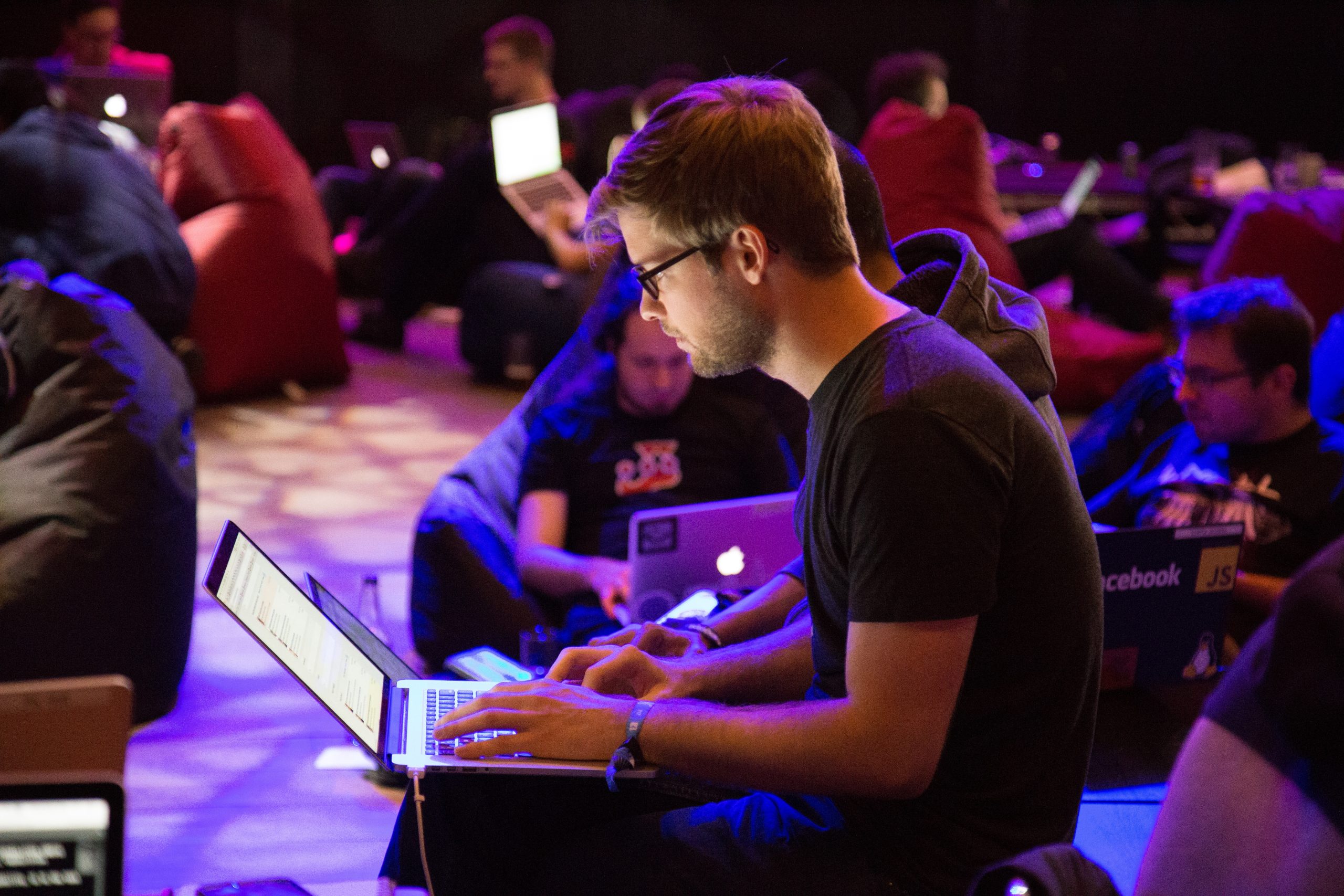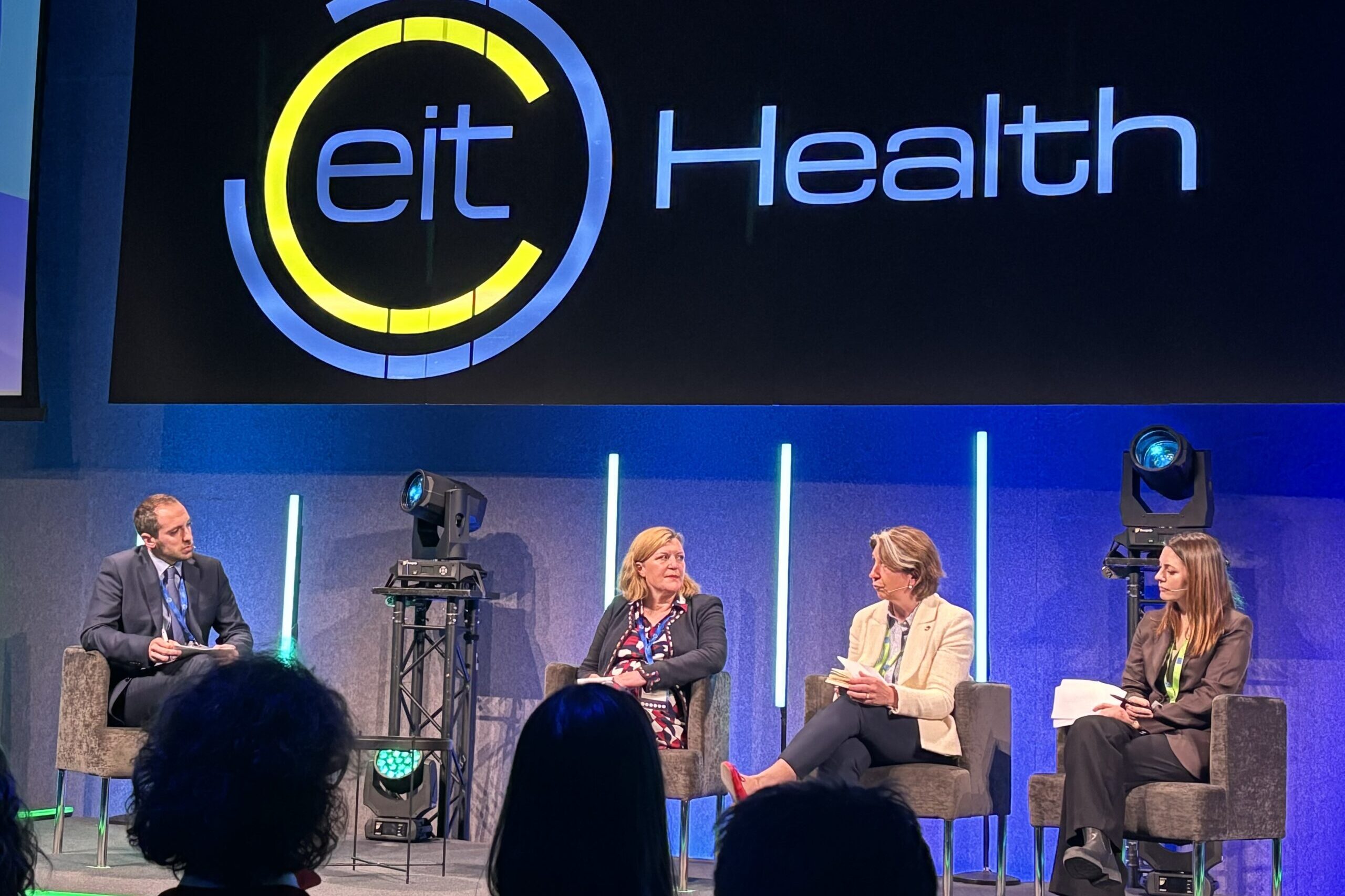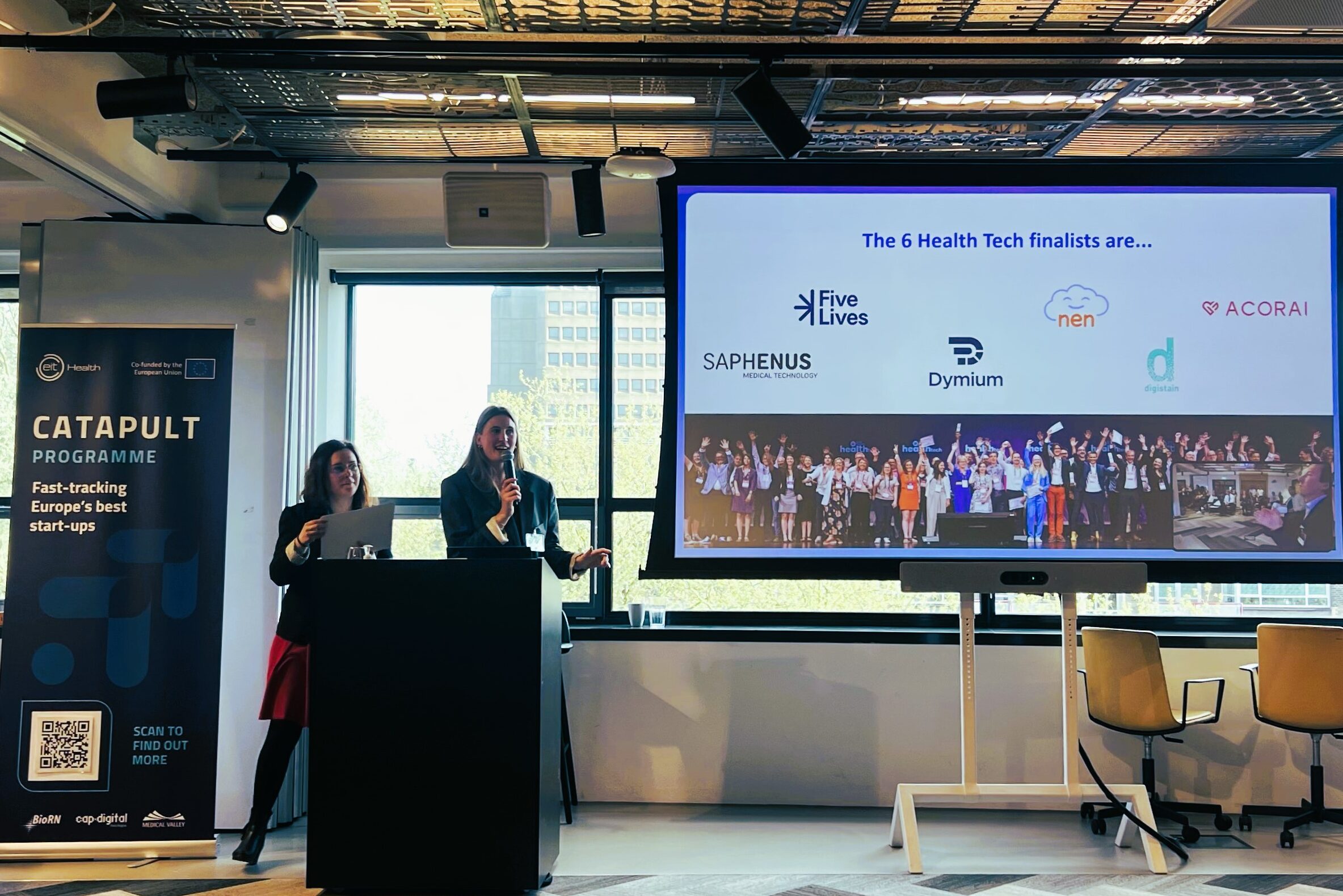26th October 2020
The finalists represent the most promising European start-ups across biotech, medtech and digital health
Twenty-one start-ups from across Europe have secured their places at the EIT Health Catapult Final in December.
The EIT Health Catapult, currently in its fifth year, is a training and competition programme that boosts the development of European health start-ups by exposing them to leading experts and international investors.
Each team will now pitch their solution to the EIT Health network (one of the largest healthcare communities worldwide including over 150 leading healthcare organisations) at the EIT Health Summit Series.
The seven finalists in each category (Medtech, Biotech and Digital Health) will compete for a podium place and three prizes per category, worth €40,000; €20,000; and €10,000.
Additionally, one of the finalists will win the “Alex Casta Audience Award” and get a unique opportunity to have their logo displayed on the Nasdaq Tower in New York’s Times Square, where it will be seen by millions of people worldwide.
This year, the EIT Health Catapult has also joined forces with leading healthcare players in Europe to further support the most promising start-ups.
Amazon Web Services (AWS), L3S Partnership, Virdis Group, Lallianse and McDermott Will & Emery have all sponsored additional prizes that will provide the winners with their expertise and support.
Dr. Kurt Höller, Director of Business Creation at EIT Health, said: “Congratulations to the finalists. The level of quality has been exceptional and the final will be a fantastic opportunity for these teams to get some well-deserved visibility in front of our community of experts and investors”.
The EIT Health Summit Series will see four live sessions take place from 24 November to 3 December. It will host talks from world-leading figures on the future of AI, healthcare entrepreneurship and business development, and the transformation of healthcare delivery, and culminate in the Health Catapult Final and award ceremony.
Find out more and register for the EIT Health Summit Series here: https://www.summit.eithealth.eu/.
Meet the finalists
Biotech
Gelmetix (UK) designs bio-inductive gels that modify cell behaviour, to treat patients suffering from chronic lower back pain and osteoarthritis. The company’s DXM gel is an injectable gel that is used to treat degenerative disc disease, the cause of 40% of all chronic lower back pain cases. It restores cell function, relieves pain and prevents further degeneration of the intervertebral disc. The company has approval to start the first-in-human clinical trials in Bordeaux this year.
GoodGut S.L. (Spain) developed RAID-CRC a non-invasive low-cost patented test that determines colorectal cancer (CRC) bacterial signatures in fecal samples, reducing 28% of colonoscopies and increasing CRC sensitivity to 98%.
LenioBio (Germany) specialises in protein expression solutions. The company’s first product, the cell-free protein expression kit ALiCE®, enables customers, such as producers of medicine or food, to drastically reduce the development costs of protein-based products and to extract difficult-to-produce proteins.
MEDETIA (France) aims to provide therapeutics for severe nephrological and ophthalmologic ciliopathy diseases. Medetia combines a premium location in a leading hospital with a unique R&D drug screening platform. Medetia has acquired an exclusive license to use new therapeutics for nephronophthisis and is targeting a clinical trial in the first quarter of 2023.
PhagoMed (Austria) focuses on the development of human therapeutic applications of phages and phage-derived proteins, which show promise in addressing antimicrobial resistance. PhagoMed currently has three active development programmes in the fields of implant-associated infections, urinary tract infections and bacterial vaginosis.
Seekyo Therapeutics (France) develops the next generation of chemotherapies. Their solution is designed to target the microenvironment of solid tumours while sparing healthy tissues. It is intended to provide efficient treatments without adverse effects, thereby improving quality of life for cancer patients.
UVera (Poland) fuses innovation and an interdisciplinary approach to provide skin protection against a spectrum of UV sun radiation. The eco-friendly product is natural and produced by specific species of bacteria, and it is intended to provide a safe and stable skin protector with no negative environmental impact.
Medtech
Aortyx S.L. (Spain) aims at providing a new generation of endovascular devices to treat vascular diseases. They are developing an endovascular bioresorbable adhesive patch that mimics the aortic tissue and restores its biomechanical environment, for treatment of aortic dissections.
GRADIENT (France) develops a unique therapeutic technology to treat pulmonary hypertension, a fatal condition that effects approximately 500,000 patients per year worldwide. This disruptive therapy results in a reduction in pulmonary vascular resistance and has shown breakthrough potential as a life-saving treatment.
New Born Solutions S.L. (Spain): develops NEOSONICS, a quick, easy, painless and cost-effective detection and monitoring system for infant meningitis.
PerAGraft (Germany) dedicates its efforts to developing patient individualised implants for cardiovascular applications and bringing them into the clinical routine. Their innovation is designed to create a new era in complex aortic aneurysm treatment by providing tailored solutions for each patient.
Sentinel Biosensor (UK) creates state-of-the-art, wearable, vital sign monitors that record data with medical grade accuracy while still being consumer-friendly, for use in hospitals and post-discharge in patients’ homes. Sentinel records pulse, respiration-rate, temperature, three-axis position, motion, stress, sleep quality, galvanic skin response and indoor GPS. It also provides cuffless blood pressure estimation and works off-grid. No connection or infrastructure is needed, either in the hospital ward or the patient’s home.
STIL B.V. (Netherlands) develops a brace to be worn by people with Parkinson’s, as a way to help stabilise their hands. More than 22 million people worldwide suffer from involuntary shaking hands, caused by Parkinson’s disease and essential tremor. STIL helps these people with a hand brace based on the concept of the technology used in noise cancelation.
Zoan BioMed (Ireland) designs and develops orthopaedic devices through the sustainable cultivation of tropical marine coral, delivering disease-free, natural, safe, and effective bone graft solutions for surgeons. An ageing population is the prime market driver for sector growth, and Zoan caters to this market through an innovation pipeline addressing the most pressing clinical needs in bone repair.
Digital Health
Brainscan (Poland) uses artificial intelligence to improve the efficiency of interpretations of brain computed tomography (CT) scans by integrating tools for classifying, localising and comparing brain pathology changes in the radiological workflow.
CardiLink (Germany) makes sure that automated external defibrillators (AEDs) work when needed, via an intelligent connectivity solution. As a next step, CardiLink is creating a vendor-neutral connected ecosystem for health and safety devices.
Methinks (Spain) develops an AI software that serves as a universal digital assistant to triage stroke from non-contrast computed tomography (CT) and unlock stroke-treatment potential.
PatchAi (Italy) aims to transform clinical research with an emphatic virtual assistant to engage patients involved in clinical trials and keep them informed and supported. By focusing on the patient, the company seeks to develop digital health solutions dedicated to safer, faster and affordable medical product development.
Popit (Finland) provides a unique and simple solution to improve patient communication and medication adherence with support that surpasses a simple pill-reminder app. The innovation addresses the challenge of patients not taking their medication properly – a problem that costs money for pharma and healthcare payers and negatively impacts patients’ health. Popit’s first customers include the world’s No. 1 and No. 2 pharmaceutical companies.
Smart Soft (Netherlands) envisions being at the forefront of AI image processing and analysis, using computer algorithms to boost efficiency. Since 2016, Smart Soft is developing CoLumbo, a cutting-edge software solution offering an automated processing and analysis of spine MRI and computed tomography (CT) studies – an unmet need on the market today.
SpotLab (Spain) develops a digital ecosystem for decentralised analysis of medical microscope images that brings together low-cost hardware devices and advanced software components for automated diagnosis.
Join the heartbeat of healthtech in Munich this June

Discover the third annual health.tech conference.
Health experts make recommendations on EHDS implementation

Discover our new Think Tank report.
